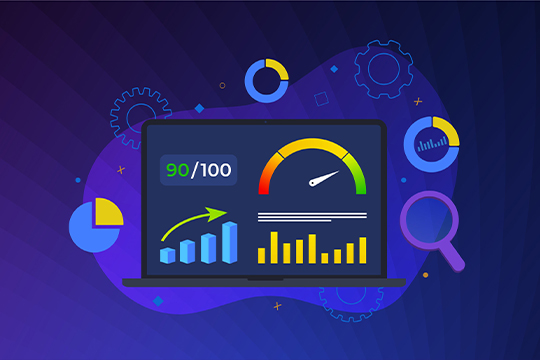One of the most annoying things that can make people stop using your resource, cost you money, and damage your reputation, is a slow website. You may improve marketing and sales operations, increase traffic, and draw in more qualified leads who can become customers by decreasing the time it takes for a page to load.
How do conversion rates relate to site speed?
Conversion rates are closely tied to site speed. A faster website keeps users engaged, reducing bounce rates and encouraging them to stay longer. Studies have consistently shown that even a slight delay in page loading can lead to significant drops in conversions. When a site loads quickly, users are more likely to complete actions like making a purchase, signing up, or filling out a form. In contrast, slow-loading pages frustrate users, causing them to leave before completing their intended tasks.

How quickly should a webpage load?
Target Benchmarks:
- 0-2 seconds: Excellent loading speed. Users will generally be very satisfied.
- 2-3 seconds: Good speed. Most users will still be engaged.
- 3-5 seconds: Fair, but at this point, you may start to see an increase in bounce rates.
- 5+ seconds: Poor Likely to lead to high bounce rates and lower user satisfaction.
Understanding Website Speed Metrics
Website speed metrics are gauges of a website’s functionality, such as how fast pages load and how interactive they are. Website owners can use these analytics to pinpoint areas that need work to improve both search engine rankings and user experience.
The three essential Core Web Vitals are:
- Largest Contentful Paint (LCP): this metric gauge the time it takes for the most substantial content element on your page to fully load. To ensure a positive user experience, your LCP should be under 2.5 seconds.
- Interaction to Next Paint (INP): This measures the responsiveness of your website to user interactions. A lower INP indicates that the site is highly responsive, providing a better user experience.
- Cumulative Layout Shift (CLS): This metric assesses the stability of your page by tracking how much the layout shifts unexpectedly during loading. A CLS score below 0.1 is ideal for maintaining a stable and user-friendly interface.

Leverage Browser Caching:
Users are alerted that they have not specified expiration dates for static images by the Leverage Browser Caching warning. The web browser is informed by the expiration dates about how long to store a particular image.
To resolve issues related to leveraging browser caching, you can follow these steps:
1. Set Expiry Dates for Static Resources
2. Use Cache-Control Headers
3. Implement ETags (Entity Tags)
4. Optimize Your CMS Settings
5. Use a Content Delivery Network (CDN)
Optimizing Images
It is the process of decreasing the image size without compromising its quality. Accelerating the loading of photos in online and mobile applications is the aim.
The following methods are employed for image optimisation:
- Making use of tools like TinyPNG or ImageOptim to reduce image size
- Using appropriate image formats such as WebP, JPEG, or PNG
- Using the HTML’s srcset attribute to define different versions of images in terms of size
- Removing unnecessary metadata from images
- Combining multiple images into one by using image sprites
- Optimizing image dimensions before uploading
- Implementing vector images (SVG) for simple graphics
- Utilizing a Content Delivery Network (CDN) to serve images faster
Mobile Optimization
The practice of making sure that users of mobile devices that visit a website have an experience tailored for their needs is known as mobile optimisation.
Typically, this process has four vital components:
- Responsive Design: Ensures the website layout adapts seamlessly to different screen sizes and orientations.
- Mobile-First Indexing: Prioritizes mobile content for indexing and ranking in search engines.
- Fast Loading Speed: Optimizes mobile page speed through techniques like minimizing HTTP requests and compressing resources.
- Touch-Friendly Interface: Designs interactive elements (buttons, menus) to be easily usable on touchscreens.

Optimizing CSS and JavaScript
JavaScript (JS) and Cascading Style Sheets (CSS) both need to be optimised for faster code processing.
By doing this, you can rapidly increase your site’s speed and enhance its functionality. To make it happen, there are multiple approaches.
- Reduction of CSS and JavaScript file size: To reduce file size and enhance load speed and eliminate spaces, tabs and comments.
- Defer Non-Critical JavaScript: To stop non-essential JavaScript from obstructing the page’s rendering, use async or defer properties.
- Combine JavaScript and CSS Files: To cut down on HTTP requests and speed up loading times, combine several files into one.
How does Ndimension Labs helps to Optimize Website Speed?
Ndimension Labs implements a complete method designed to improve performance, which aids in optimising the speed of websites. Their strategy consists of:
- Image optimisation that includes resizing and compressing images so that they can load faster
- Code minification is the process of shrinking HTML, CSS, and JavaScript files to speed up load times
- Browser Caching: Configuring caching rules to reduce the number of server queries by storing static resources locally
- Content delivery networks (CDNs) are used to distribute content, enabling faster worldwide access
- Database optimisation is the process of organising and optimising databases to provide quicker query answers
All of these methods work together to guarantee a quicker, and more effective website.
To boost your website’s speed and deliver a seamless user experience, partner with Ndimension Labs. Their expert team will implement tailored strategies to optimize your site, ensuring faster load times and improved performance.
Contact Ndimension Labs today to elevate your website’s speed and keep your visitors engaged and satisfied.

